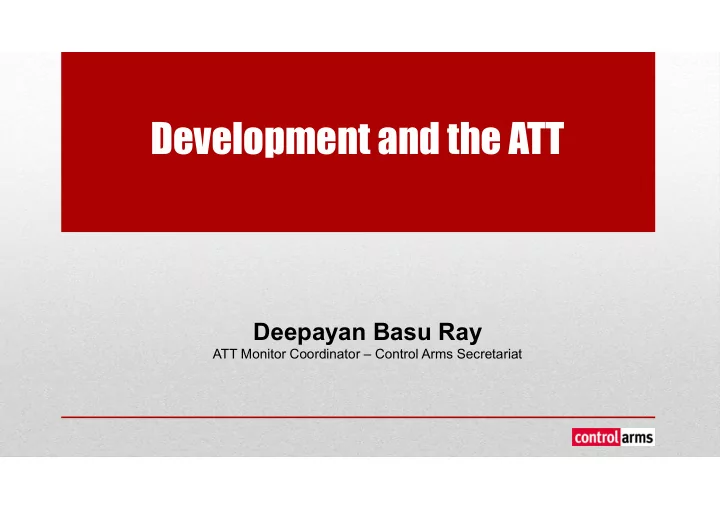

Development and the ATT Deepayan Basu Ray ATT Monitor Coordinator – Control Arms Secretariat
How do arms transfers affect development? • aggravate armed violence (conflict, crime, serious violations of human rights); • undermine post-conflict peacebuilding and stabilization; • are used to legitimate unaccountable or irresponsible state spending; • involve/perpetuate corruption.
The devastating impacts: the socio-economic costs • While ODA to fragile countries fell by 8% between 2009 and 2010, military expenditure in these countries grew by 12%; • All LICs and LMICs which allocated more than 10 per cent of CGE to the military in 2009 scored poorly on corruption indices (eg. TI-CPI); “…no low- • Armed conflict costs Africa more than income fragile or conflict-affected US$18bn each year – more than US$284bn country has yet between 1990 and 2005; achieved a single MDG…”
Existing Standards The ATT has built on existing commitments to consider development in arms control arrangements • UN guidelines for international arms transfers (1996) • Wassenaar Arrangement Best Practice Guidelines for SALW • OSCE Principles Governing conventional International arms transfers (1993) • OSCE Document on Small Arms and Light Weapons (2000) • ECOWAS Convention • Best Practice Guidelines for the Implementation of the Nairobi Protocol • EU Code of conduct/Common Position on Arms Exports (1998)
Linking ATT Implementation with Official Development Assistance (ODA) • ATT implementation activity can be supported through Official Development Assistance (ODA) funds; • The activity must pass the ‘development purpose’ test: • Demonstrate ‘need’, impact, and effective targeting. • In order to access these funds, recipients will have to ensure transparency, accountability, and public reporting.
Linking ATT Implementation with Official Development Assistance 15210 – Security system management and reform • Security System Reform Technical co-operation provided to parliament, government ministries, law enforcement agencies and the judiciary to assist review and reform of the security system to improve democratic governance and civilian control. Eligible assistance is limited to non-military competence / capacity building and strategic planning activities that promote political, institutional and financial accountability, civilian oversight, and transparency. Furthermore, any such support to defence ministries must be part of a national security system reform strategy and be approved by the partner country ministry with overall responsibility for co-ordination of external assistance. 15240 – Reintegration and SALW control a. development of laws, regulations and administrative procedures for the control and reduction of weapons proliferation; b. development of institutional structures for policy guidance, research and monitoring;
2005-2014 ODA Expenditure on Security Sector Reform Development Initiatives’ calculations based on OECD DAC’s Creditor Reporting System (CRS) 2014 download
Recommend
More recommend